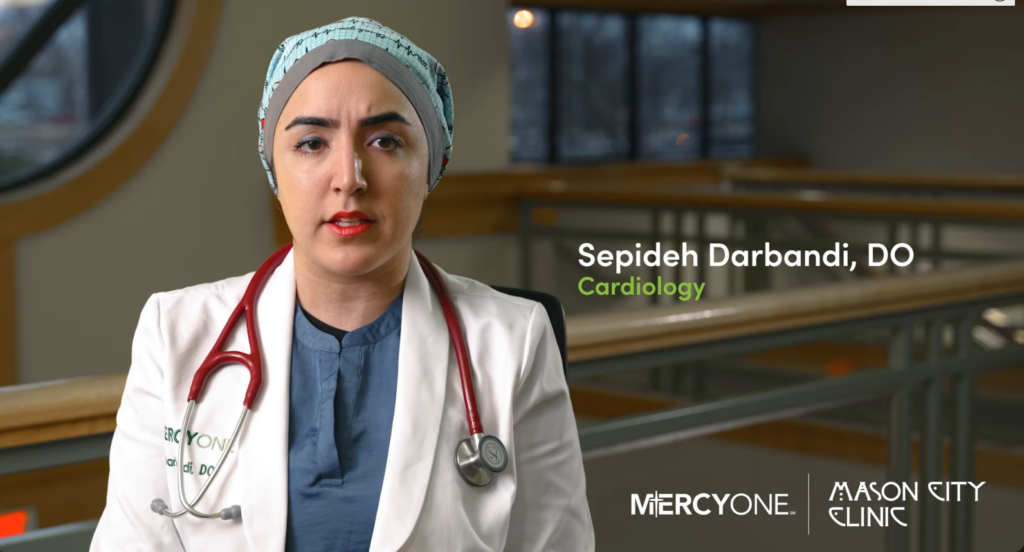Heart health is a critical aspect of overall wellness, yet it often receives less attention than it deserves, especially among women. Cardiovascular disease remains a leading cause of mortality for women, partly due to the under-recognition of symptoms and risk factors. This blog aims to shed light on the unique aspects of women’s heart health, the importance of recognizing symptoms, and proactive steps for maintaining a healthy heart.
Dr. Sepideh Darbandi, a popular cardiologist at the Mason City Clinic, highlights the unique presentation of heart disease in women. She explains, “Unfortunately, cardiovascular disease remains a leading cause of mortality. One of the main reasons for that, I believe, is just under-recognition of symptoms, not knowing what to watch out for, what is concerning, and when to seek care.” Women often experience atypical and uncommon symptoms, which can delay diagnosis and treatment.
While chest pain and shortness of breath are common heart attack symptoms in both men and women, women may also experience more subtle signs such as fatigue, nausea, or simple shortness of breath. These symptoms can often be mistaken for less serious conditions, which is why awareness and education are crucial.
Understanding and managing risk factors is essential for preventing heart disease. Key risk factors include hypertension, diabetes, smoking, family history of coronary heart disease, and conditions like sleep apnea. Dr. Darbandi emphasizes the importance of regular medical care, saying, “These women certainly need to seek medical care, appointments with their primary care physicians, and seeing a cardiologist specialist to further discuss the risks of developing heart disease.”
Smoking cessation, blood pressure control, and managing conditions like diabetes and sleep apnea are vital steps in reducing the risk of heart disease. Women should actively engage with healthcare providers to monitor and manage these risk factors effectively.
Adopting a heart-healthy lifestyle is a proactive approach to preventing cardiovascular disease. Dr. Darbandi advises against greasy and fast foods, recommending a diet rich in seafood, lean proteins like chicken, and plenty of vegetables. She states, “Anything that you can get in the drive-through, probably not too good for you.”
Physical activity also plays a significant role in maintaining heart health. The general recommendation is at least 30 minutes of physical activity, such as walking, totaling up to 150 minutes a week. Regular exercise helps in managing weight, reducing blood pressure, and improving overall cardiovascular health.
Healthcare providers play a crucial role in managing women’s heart health. Dr. Darbandi shares, “What I love the most about taking care of patients is being able to make that impact in someone’s life, being able to answer that question that has been bothering them and not giving them sleep at night kind of thing.” Establishing a strong patient-provider relationship ensures continuity of care and a better understanding of individual health needs.

Heart disease not only affects physical health but also emotional well-being. The vulnerability associated with heart disease can be overwhelming. Dr. Darbandi finds it fulfilling to support her patients through these challenges, highlighting the importance of compassionate care in managing heart health.

Women’s heart health requires attention and proactive management. By recognizing symptoms, managing risk factors, adopting a healthy lifestyle, and maintaining strong healthcare relationships, women can significantly reduce their risk of heart disease. Dr. Darbandi’s insights emphasize the importance of awareness and preventive care in ensuring a healthy heart.
For a deeper understanding of women’s heart health, watch Dr. Darbandi discuss this topic in detail in the following video:
By implementing these strategies, women can take control of their heart health and lead healthier, longer lives. Let’s prioritize heart health and make informed choices for a better future.
Up-to-date. Down-to-earth. Close to home. Lots of great reasons to make Mason City Clinic
your first choice for all your family’s specialty healthcare needs.
250 S. Crescent Drive, Mason City, IA 50401
Tel: 641.494.5200
Toll Free: 800-622-1411
Fax: 641.494.5403